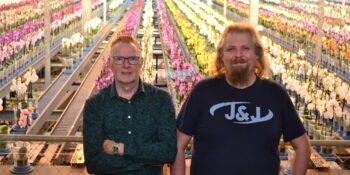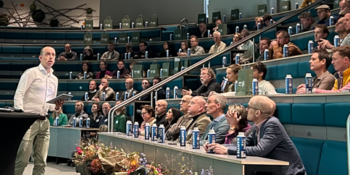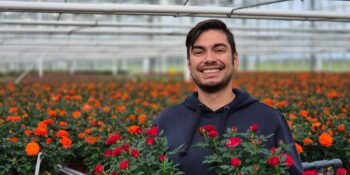It’s the largest rose grower in the world, processing three million sustainably grown roses every day. Located in Ziway, Ethiopia, Sher Ethiopia covers an area the size of 1,200 football fields. The company has been working with the Floriculture Sustainability Initiative (FSI) to make its operations even more sustainable. “We want to be front runners in terms of sustainability, and collaboration is a big part of that”, says Franks Kuipers, advisor at Sher Ethiopia.
Working with companies such as MPS and Sher Ethiopia, the FSI is well on its way towards ‘FSI 2020’. Its aim is to see ninety percent of all flowers and plants produced sustainably by this milestone year. A key part of this is ‘Credible Record Keeping’, which FSI uses to make the environmental impact of aspects such as crop protection products transparent and to reduce their use. Credible Record Keeping is also a fundamental requirement of FSI post-2020, which is met by participants with an MPS-ABC certificate. Sher Ethiopia has MPS-A status and has also been MPS-GAP and MPS-SQ certified for almost ten years.
Fish prove the point
“We owe our long-standing MPS-A ratings to the fact that we are committed to growing as naturally as possible. We use very few crop protection products and as many biological controls as we can,” Kuipers says. “Sustainability is becoming increasingly important, so you need to make that switch if you want to retain your market share. In addition to working with FSI, we have also signed the IRBC agreement, which contains arrangements promoting a more responsible approach to the international production of ornamental crops. We believe that joint arrangements will contribute to achieving a sustainable ornamental horticulture chain.”
We believe that the more you put in, the more you get out. After all, it’s important to look after your people.
One of the innovations that helps make the production of roses more sustainable is the ‘wetlands’ system. “This is a water system that has been specially designed by Wageningen University and Research (WUR) for reusing water.” Water that is normally flushed down the drain is purified by the roots of reeds and ultimately ends up in a pool that is populated by fish: living proof that the water is clean. Kuipers: “We use the water purified by the wetlands to water the roses. These wetlands also prevent any contaminated water from flowing into the surrounding area.” The environment is a priority for Sher Ethiopia anyway, says Leen van Driel, auditor at MPS-ECAS. “I visited them to carry out an audit in August this year. They have planted lots of trees, and when you walk through their grounds you are struck by how green it is.”
Sleeping, playing football, packing

The wetlands of Sher Ethiopia.
Sher Ethiopia grows seventy different varieties of roses. As Kuipers explains, “Germans have a completely different taste in roses from Danes, for example.” But the company’s activities in Ethiopia are not limited to growing roses. In 2008 they built a sports complex for the people of Ziway. “Lots of our packers play football in the afternoon, then start their packing shift and go to bed after that. There are dozens of teams, and we even have an internal competition.”
Operating in Ethiopia also raises various issues for Sher Ethiopia. “There is an ongoing debate about the living wage. We believe that social facilities are at least as important. We have, for example, a hospital, a church and a school on our grounds, all of which can also be attended by people who don’t work for us. We started small with the school, but now it has more than 6,000 pupils. Lessons are free and are taught by Ethiopian teachers,” Kuipers says. “We believe that the more you put in, the more you get out. After all, it’s important to look after your people.”



